What Does God Want From Me?
![]() Jesus is traveling with a crowd, teaching as He walks. A blind man sitting by the road hears the passing commotion and asks what is going on. When he learns that Jesus of Nazareth is near, he calls out, “Jesus, Son of David, have mercy on me!”
Jesus is traveling with a crowd, teaching as He walks. A blind man sitting by the road hears the passing commotion and asks what is going on. When he learns that Jesus of Nazareth is near, he calls out, “Jesus, Son of David, have mercy on me!”
Several times the man calls out, even louder after some in the crowd tell him to be quiet. “Son of David, have mercy on me!”
Jesus stopped and ordered the man to be brought to him. When he came near, Jesus asked him, “What do you want me to do for you?”
– Luke 18:40-41 (NIV)
I am that blind man calling out to God.
Encourage me. Strengthen me. Provide for me. Comfort me. Save me. Give me. Help me.
That’s what I want.
What do you think these kids want? What are they crying out for?
Fifty kids in Haiti. All at the same center. All need God’s love. All need God’s mercy.
How about you? What are you calling out to God for?
All the while we cry out, God is calling out to us. Follow me. Be like me. Share my love.
Is it possible that my needs and your needs complement these kids’ needs? That we offer one another an opportunity to give God what He wants?
Continue Reading ›Christmas in Haiti

In Haiti, Christmas is widely celebrated by Christians and non-Christians alike as a holiday with non-religious aspects.
Continue Reading ›Fighting the Restavèk Curse in Haiti
Restavèk is a Creole word for a Haitian child who stays with and works for another family. A restavèk child can be a boy or a girl who is given away by a poor family in order to survive. Frequently, the restavèk’s most basic rights to health and education are denied.
Of these children, 65 percent are girls between age 6 and 14. They are forced to work long hours under harsh conditions and are subject to mistreatment, including sexual abuse.
The restavèk child is the first person to wake up in the morning and the last one to go to bed, sometimes after 14 hours of work that consists of, among other chores, carrying water, washing clothes, taking the owner’s children to school, doing errands, and cleaning the home.
The restavèk child is often beaten for the simplest mistakes. Laws against child abuse exist in Haiti, but unfortunately, they are seldom enforced as children’s rights don’t have a high a priority.
The number of restavèk children reported nationally is between 250,000 and 300,000, and this domestic phenomenon is due to several reasons. (more…)
Was My Sponsored Child Affected by That Crisis?
In a perfect world, here’s how the process would work:
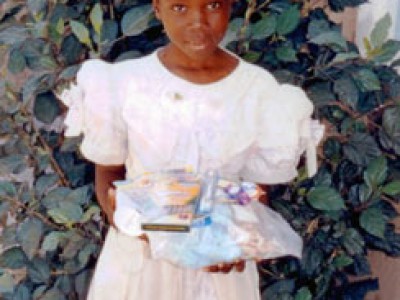
Does Giving Gifts to Our Sponsored Children Make a Difference?
One of my earliest lessons in the importance of our gifts came from Tausi (Tanzania). I began sponsoring her soon after her stated birth date (which later proved to be wrong, but…) and immediately sent a gift of $25.
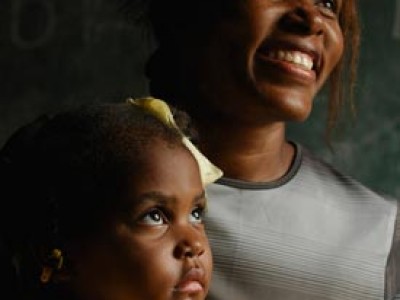
Ti Chape
It’s a Creole phrase that many parents in these poorest areas of Haiti use with their youngest kids. I’m sure you’ll hear it often over the next several days as we visit homes. It’s a term of endearment … but also a harsh reality that reminds everyone of how devastating each day can be for people living on the brink. Ti Chape means little survivor or one who has escaped death
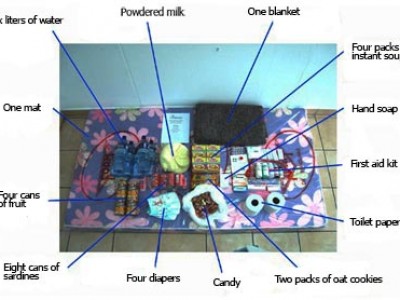
Disaster Relief Kit: What’s Inside?
After a disaster occurs in one of our countries, we often raise money to help those affected. We do this to help provide things such as food and water, shelter, bedding, trauma counseling or medical treatment, among other needs. Many times we also send disaster relief kits.
Haiti News: Changing Children Within a Community
Growing up in Haiti, Milord was no stranger to need. In his rural home of Petit-Goave, where the average income is barely more than $1 a day, he experienced poverty personally and saw how it affected those most vulnerable, women and children. It became his personal dream to impact his community for good.
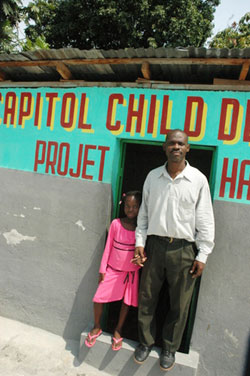 When he moved to the city and became part of the Capitol Development Center, he became the leader of the youth club … and decided he wanted to become the leader of the entire child development center so he could help make an impact on his community.
When he moved to the city and became part of the Capitol Development Center, he became the leader of the youth club … and decided he wanted to become the leader of the entire child development center so he could help make an impact on his community.
Milord was so committed that he, once a Compassion-sponsored child himself, achieved this mission when he became the director of the Capitol Development Center. He is honored to minister to 450 children through the child sponsorship program and 90 children and caregivers through the Child Survival Program (CSP). His mission is to bring them spiritual, socio-emotional and economic change.
Milord has now been successfully working as the center director for eight years. He became director just several years after graduating from the program himself, having studied social work and theology at the university. (more…)
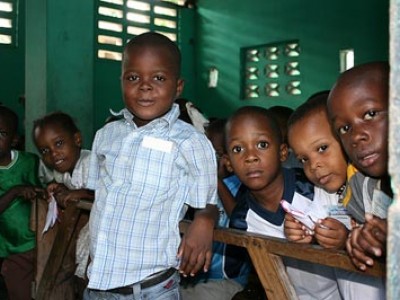
A Day in Port-au-Prince
The first thing you notice when you wake up in Port-au-Prince is the smoke. Your eyes sting, and it feels as though you’ve had a smoky cloth held over your mouth all night from the Haitians’ cooking fires.
Compassion Haiti’s 40th Anniversary
Compassion started its ministry in Haiti in 1968. At that time, we worked directly through the missionaries established in the country while maintaining no country office or local staff. But through the years, our structure has changed as more and more children have been registered in our programs.
10 Questions With Ephraim Lindor
Thank you to all of you who submitted questions for Ephraim, my esteemed colleague in Haiti! As you all were curious cats and asked more than 10 questions, I picked 10 that I thought were representative of all the questions.
As I mentioned before, Ephraim has got a lot of perseverance. Check out the Compassion Haiti staff photo from 15 years ago. He’s one of only two staff members still remaining.
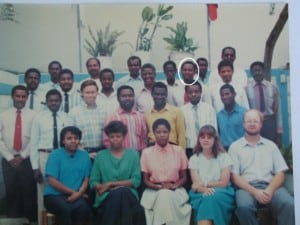
Haiti is economically considered one of the poorest countries of this hemisphere. However, this country is also unique in its natural and culturally diverse resources.
The Haitian is born with the ability to make the most beautiful artwork in the world. No matter the social class he is issued, the Haitian is capable to transform the simplest raw materials into the most enjoyable items. The Haitian paintings are of the greatest imagination, along with our sculpture in wood, steel, or stone.
Although most of its natural resources are unexploited, Haiti is one of the countries with the most beautiful beaches in the Caribbean.
Besides all of its artistic ability, most of the educated Haitians speak up to four languages: Creole (native language), French (official), English, and Spanish with proficiency.
2. I would love to hear your favorite story of children in your programs whose lives were really turned around by being part of Compassion. (Amy)
There are so many success stories that I could share but there this one that is unique to me. It is about a boy named Zaccalot. (more…)
Ask the Field: El Salvador and Haiti
Okay, everyone. Limber up those fingers. It’s time for the next round of Ask the Field. It’s time for you to ask questions of two of my fabulous coworkers, Ephraim Lindor of Haiti and Roberto Medrano of El Salvador.
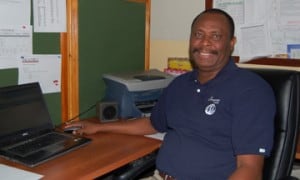 Ephraim has been working with Compassion Haiti for 22 years. (Talk about perseverance!)
Ephraim has been working with Compassion Haiti for 22 years. (Talk about perseverance!)
He first worked for Compassion as a translator, and he is now the field communications supervisor for Haiti. His daily work includes interviewing Compassion beneficiaries and writing stories about their success.
Ephraim is always smiling, and he loves watermelon. Besides all the work he does for Compassion, he’s a pastor at his local church, a loving father of a 21-year-old woman and a 15-year-old boy, and a loving husband of 23 years.
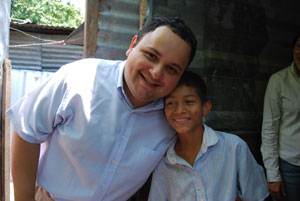 Roberto has been working with Compassion El Salvador for 6 years. He first worked for Compassion as field communications specialist and now he is the communications and tours specialist for Central America and the Caribbean, which means he is in charge of training and supporting all Compassion countries in that region for communications and tours. (He’s a busy guy!)
Roberto has been working with Compassion El Salvador for 6 years. He first worked for Compassion as field communications specialist and now he is the communications and tours specialist for Central America and the Caribbean, which means he is in charge of training and supporting all Compassion countries in that region for communications and tours. (He’s a busy guy!)
Roberto is the youth pastor of his church, and although he is just 30 years old, he has been preaching for more than 26 years. He was a child preacher, and that is one of the reasons why he loves Compassion’s ministry — he has witnessed first hand the impact of God’s Word when you are a child. He is crazily in love with his beautiful wife, Yolanda, an ORU graduate that fully supports him in working on behalf of children.
So now it’s your turn to ask away! You know the drill by now — I’ll choose 10 of your questions for them to answer.


